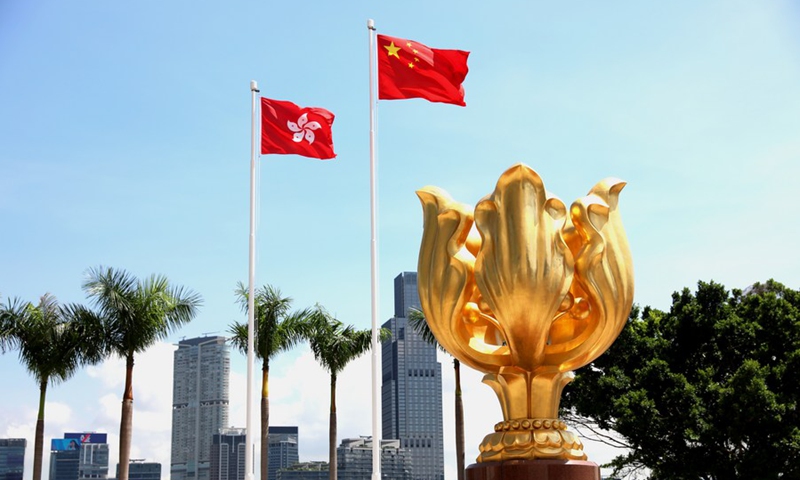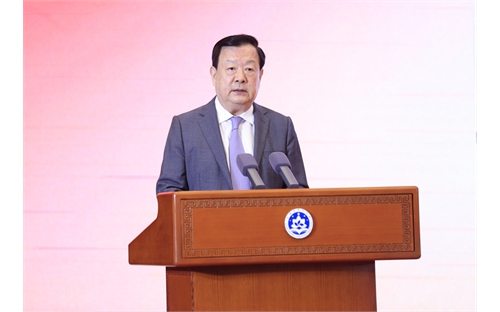Chinese law decides whether Jimmy Lai can hire a British lawyer: Global Times editorial

The Golden Bauhinia Square in south China's Hong Kong File photo: Xinhua
The Standing Committee of the 13th National People's Congress (NPCSC) is convening its 38th session in Beijing. One of the session's special agendas is that lawmakers heard explanations to a proposal for giving an interpretation to related provisions in the Law on Safeguarding National Security in the Hong Kong Special Administrative Region (HKSAR). Previously, in response to the fact that Jimmy Lai Chee-ying, founder of Hong Kong media group Next Digital, was allowed to hire a British barrister to defend his national security trial, the HKSAR government submitted a request to the NPCSC to interpret the National Security Law (NSL) for Hong Kong, so as to clarify whether overseas lawyers without local full qualifications should be permitted to work on national security cases in any form. Since this trial is a special case involving national security, people from all walks of life in Hong Kong attached great importance to it, expecting the NPC's interpretation of the law will end disputes, clarify the original meaning of the law and plug the system loopholes of leaking secrets and external interference in national security cases.One of Lai's charges was suspected of "collusion with a foreign country or external elements to endanger national security." The case involved complex foreign-related evidence and major national security interests. As this is the first national security law case that has applied to hire an overseas barrister coming to Hong Kong to defend the defendant, there are certain ambiguities in Hong Kong law so that an almost absurd matter that Lai and his gang hired an overseas lawyer without local full qualifications to participate in defending the crime of "collusion with foreign forces" took place. It is widely known what role Lai played in colluding with external forces such as the US and the UK in the protest against the Hong Kong extradition bill in 2019. This is why the HKSAR society, notably those who are staunch in loving the country and Hong Kong and righteous people in legal community have expressed strong indignation and fierce criticism.
In this context, the chief executive of the HKSAR government suggested that the NPCSC give explanantions to the NSL for Hong Kong in accordance with the law. This is not only exercising the legal powes granted to the chief executive by the Hong Kong NSL, but also the active fulfillment of constitutional responsibilities, which fully embodies the chief executive and the HKSAR government's responsibility as the "head of the family" and the "first responsible person" of Hong Kong. It should be pointed out that this is not a legal request for interpretation specifically for the case of Lai, but how to clarify this current legal blind spot and make a clear and authoritative explanation based on the original intention and purpose of the NSL for Hong Kong. It will become the basis for handling similar cases in the future, so as to avoid the recurrence of related disputes.
Since the NSL for Hong Kong is a new law, it is normal that there are some ambiguities in the understanding and rules of the provisions in the process of its implementation. In fact, there is no country in the world whose laws do not need to develop with the times. Improvement and supplementation of laws in practice in the process of rule of law is the normal state and experience of human legal practice. However, before the NPCSC made a decision in this regard, some US and Western public opinion cannot wait to hype again that the interpretation of the law undermines Hong Kong's autonomy and judicial independence, and affected the "fair trial" of Lai's case. They almost speak out what was in their minds: Hong Kong is "autonomous," the judiciary is "independent" and the interrogation is "fair" only when Lai, who gravely endangered national security and claimed to "fight for the US," is acquitted.
Let's look at previous arguments from these Westerners. Last year, the Hong Kong Department of Justice had planned to hire British barrister David Perry as the lead prosecutor in the unauthorized assembly and participation case involving nine people including Lai.
This was only an accusation of violating public order, but a group of British politicians jumped out and considered that Perry should "offer his services for the defense and not for the prosecution," and accused this practice of not complying with British regulation.
Former British foreign secretary Dominic Raab made personal attacks against Perry, saying he is behaving in "a pretty mercenary way." Lord Falconer of Thoroton, former lord chancellor, said, "He must withdraw as he cannot continue in that role and remain consistent with the values of the UK."
The phrase "consistent with the values of the UK" reveals the inner voice of those anti-China forces who are "worried about Hong Kong's judicial independence," which is, Hong Kong's judicial practice should be in line with the political interests of the UK.
From this perspective, to ensure the stability of the practice of One Country, Two Systems and the independence of the judiciary under the framework of the Basic Law, it is necessary to exclude the interference of external forces and ensure that Chinese law has the final say. During the past five interpretations of the Basic Law by the NPCSC, some external forces had tried to create controversies within Hong Kong society, discrediting the rule of law and One Country, Two Systems in Hong Kong, and even ulcerating the rule of law in Hong Kong. However, the five interpretations have proved to be effective in quelling disputes and patching up any possible loopholes in the practice of the rule of law in Hong Kong. The benign interaction between the central government and the HKSAR government, as reflected in the interpretation of the Basic Law, is an inherent part of the practice of One Country, Two Systems. This is a natural and logical process.
With the implementation of the NSL for Hong Kong, the Hong Kong society has found order out of chaos and is entering a new stage of governance and prosperity. We believe that with the continuous improvement of the NSL for Hong Kong, the good governance of Hong Kong society will also continue to be consolidated and enhanced.
As for why Jimmy Lai's gang insisted on hiring British lawyers without full license to practice law in Hong Kong, it is obviously not because there are no proper lawyers to hire in Hong Kong. They just intend to challenge the implementation of the NSL, fantasizing about escaping due punishment and taking the chance to show their "final value" by creating a controversial topic. But such a delusional attempt will surely fail. The US and Western politicians cannot influence the internal affairs of the HKSAR, nor do they have the right to interfere with the practice of the rule of law in the governance of the HKSAR. Only the Chinese law is the final basis.

